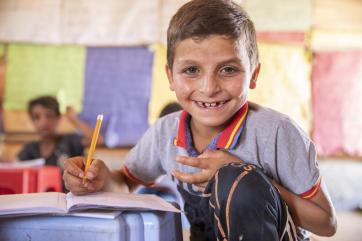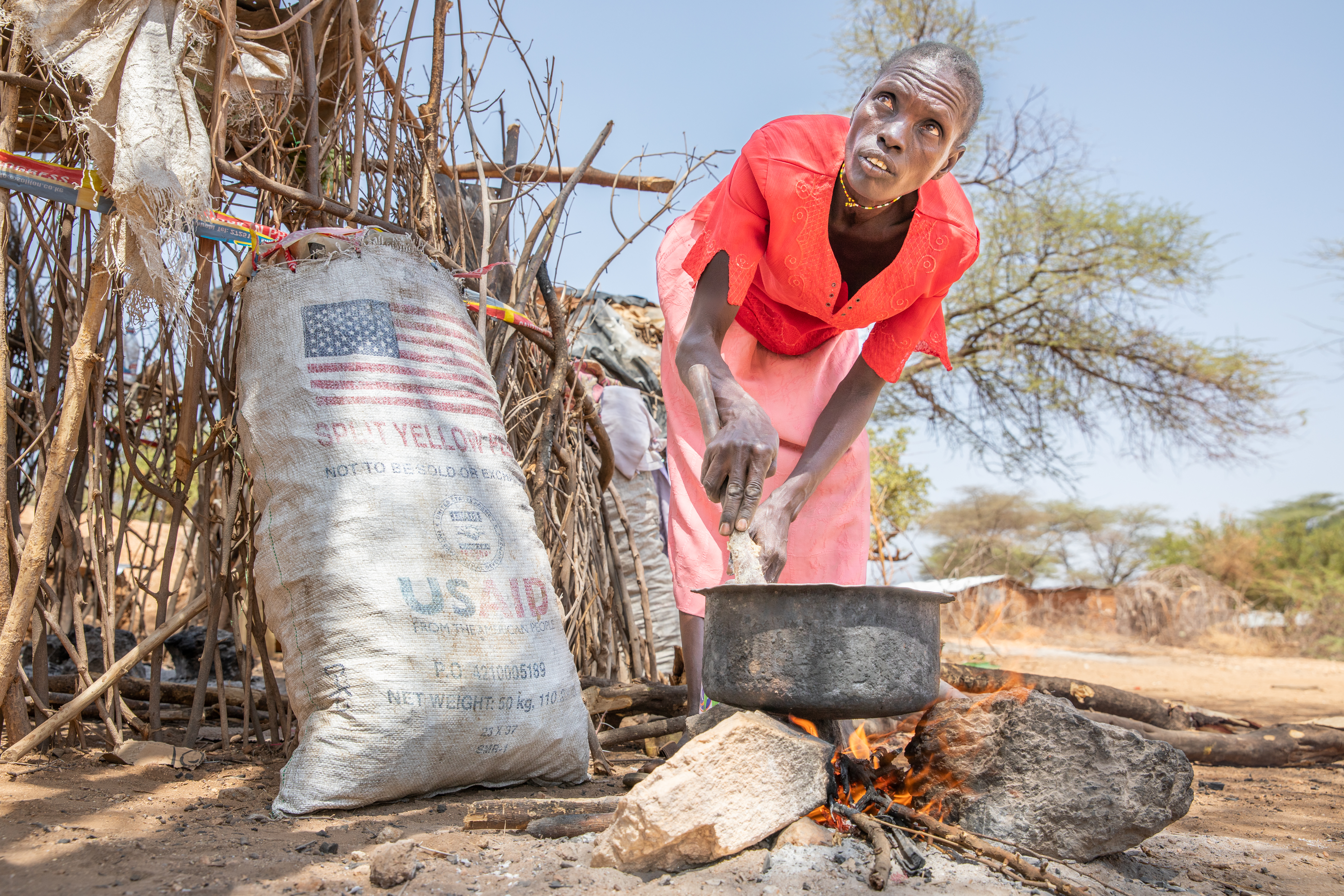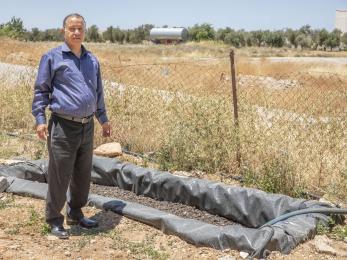I lost everything when my home was bombed. So I built a school for refugees.

In Syria, I never worked in education. I was in the cattle and cow trade, and we had agricultural land: olives, pistachios, almonds, and grapes. Our standard of living was good. It was death that drove us out of our homes.
I decided to leave Syria when the destruction hit my home and members of my family were killed. We left our village for another, but we found it destroyed. So we went to another, but it was destroyed. It was impossible to find security—the airstrikes left no woman, child, animal, or even tree safe. Bombs fell on anything. When part of my home was destroyed, I watched from afar as a truck came and carried away my remaining furniture.
I left Syria psychologically destroyed, and my financial situation was bad. I slept in the open on the Syrian border for 10 days until Jordan received us. They were good and kind. But I had never slept in a tent or even seen one assembled. With some people’s help, we built it on farmland and lived there among several other families.
"Our standard of living was good. It was death that drove us out of our homes."
In Syria, one of my hobbies was reading and drawing posters. I love reading and writing and I love being with children. When I sit with children, I feel like I am living in a different world. It’s like living a dream because children are pure.
It started as a small idea. I said to my wife, “We have children, so why don’t we assemble them in one place to teach them and protect them from the heat of the sun?” Illiteracy was spread among about 90 percent of the camp, including the parents. The majority of people were uneducated. Many had dropped out after second or third grade and eventually gotten married, which ended their educations. My wife was very fond of the idea and encouraged me. “These children should be disciplined,” she said.
One day at a family gathering, I asked my relatives: What if we started a small school to teach children how to write their names or read some phrases for when they go to the pharmacy or the doctor? It was just a simple idea, but we started to develop it, and when we decided to build the tent, we asked the families in our settlement to each pay a small amount. When we started, there wasn’t even furniture. Students sat on stones.

I wasn’t that nervous, but anytime a person starts something new, the first step is going to be hard. The first week of teaching was really difficult because I wanted to understand the students and their personalities — whether they were calm, had a temper, were listeners, or were troublemakers.
My goal was to teach them the basics: math, science, religion, Arabic, and English, so that when the day comes for them to enter public school, they will have an educational foundation. This is better than nothing. Public schools won’t accept them at age 12 or 13 if they are not able to read or write.
I bought everything with my own money, because I believe children are the core we should maintain. If we don’t preserve children today, they will be neglected and will deviate from the straight path. They will do bad things. I wanted to establish this school in a humble and simple way, to offer it to these children, since they are my group, my family.


The youngest children came here when they were very young or were born here. When we tell them about Syria, they say, “Syria is full of trees and water — a paradise,” but they don’t know anything about the internal conditions. We are telling them little by little. Being pure, they think that Syria is a paradise, full of everything they need.
But for me, Syria means everything. Syria is the breath which enters my body. Because Syria is the place where I grew up, I cannot forget it. It is impossible to forget. We hope to be able to go back to Syria one day. We have friends and loved ones there, those who are still alive. We hope to go back to see them as soon as possible.
"Syria is the breath which enters my body. Because Syria is the place where I grew up, I cannot forget it."
When you see me, you may think that I am happy and smiling, but when you look inside me, it’s totally different. I have not seen my father in seven years. What will his condition be? Or the condition of my sister, my brother, or those who are close to me? I have a daughter I haven’t seen for seven-and-a-half years. This affects me badly.
We are close enough to the border that when I hear the bombs, particularly at night, I imagine I am there inside the explosions. I get a strange feeling that makes me faint sometimes. I imagine that my father, my brother, my uncle, or my neighbor could have been underneath that bombing. It could have even been my son. It could have been my daughter.
Every bomb feels like an earthquake that shakes my whole body. I fear the bomb is meant to hit my family, relatives, or friends. I try to shake these thoughts from my mind and escape the truth. I try to pretend not to hear, but my whole insides, even my bones, shake. My heart melts.

I wish we could go back to living normally like everyone else. I wish the children who live here in tents could go back to living normally. You can see how difficult it is to live in a tent, especially during the cold weather, in winter. Children shiver because of the cold weather. Yet we try to hold it together, hoping that one day our plant will grow, and flowers will bloom for everyone to enjoy their scent.
Here in the school, a great part of the stress and internal tension I have fades away. Here, I get rid of some of my sadness and empty my mind and create some hope. This school and these children are my safe haven. I feel like I am living in another world when I am here. I feel happy and relaxed. Once I step outside the school, all life’s stresses come back to me.

So every day I try to think of new ideas. One day I asked the children to draw a picture of flowers, trees, or anything. Each one of them drew a picture from their imagination, and my prize to them was to hang them on the school walls. When a student does something, even if it is small, he considers it an achievement. They say, “Professor, I pasted this paper. I cut this paper.” For them, this is an achievement, and this is what I am encouraging them to do so they will be able to depend on themselves.
So I asked, who has nylon bags at home? Of course, everyone has them, so they rushed to their homes to bring different colors of nylon bags. We cut them into strips and tied them together and hung them from the ceiling as decoration. Every day we come up with a new idea together. Students come and say, “Professor, I brought you a cardboard box; Professor, I brought you a painting, and we would like to put them up.”
I don’t consider it nylon or paper. It is a psychological amusement for students — a release for the energy and pressure that exists inside them so it can be replaced with something good to ease their minds.
"This school and these children are my safe haven. I feel like I am living in another world when I am here."
What’s hard is I am currently desperate, as I am short of money. I cannot buy markers. I need pencils for the kids. If I asked their parents to buy notebooks for them, they would drag their kids home. So mostly I have to use my own money. This school can be shut down at any moment, as I am about to be broke.
But for all children, Syrian or not, education should be a priority, because education is an incubator. Children who are in school will learn, have fun, and store things in their memories and imaginations. The children here all love school and come here even before I do because they all have passion and love for this school. Everyone who comes here tells me they feel relaxed. My wish is to transfer my feelings to everyone who steps into this place.
We have something here that cannot be found elsewhere.

How you can help
Mercy Corps is helping refugees around the world find the critical support they need to keep going. In Jordan, our partnership with Cisco has connected Ahmad and thousands of other refugees to the documentation they need through the Khabrona app.
As conflict continues in Syria, more of its people need help every day. You can support refugees like Ahmad who are fighting to survive crisis and build better lives. Every single contribution helps us provide more support to people and families who need us around the world.
This story has been edited for space and clarity from a Mercy Corps staff interview with Ahmad in Jordan.


